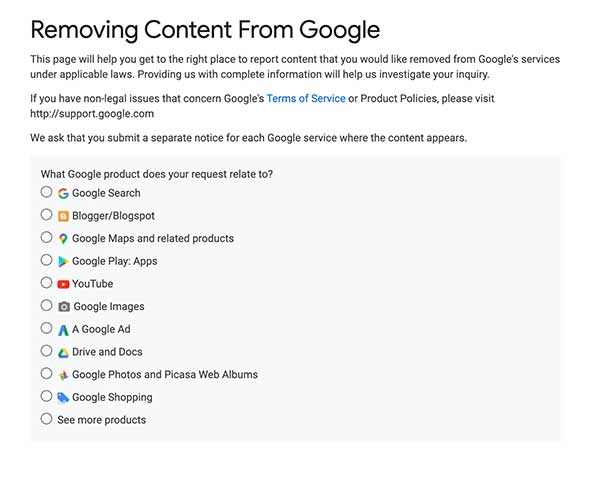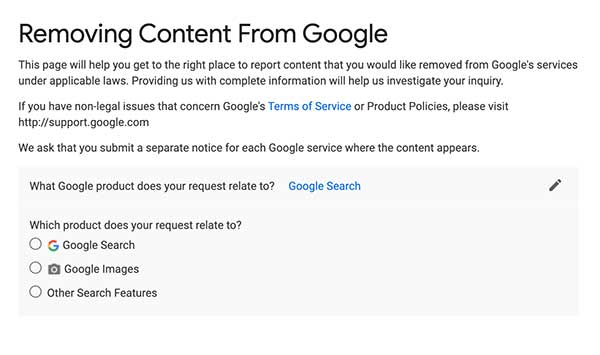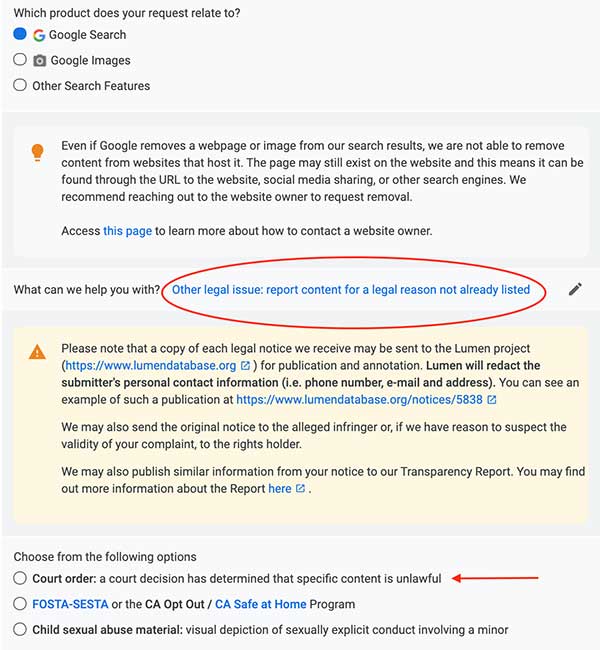
How to Remove Defamatory Content From the Internet
This page has been peer-reviewed, fact-checked, and edited by qualified attorneys to ensure substantive accuracy and coverage.
If you have been the victim of internet defamation, online harassment, or other malicious online content, you are probably wondering how to remove defamatory content from the internet—or whether it is even possible.
Fortunately, there are several ways affected individuals and business can remove defamatory content from the internet:
- Request the person who posted the defamatory statements to remove the content,
- Contact the website displaying the defamatory content and request that the content be removed,
- Obtain a court order to be provided to a search engine, such as Google, and request that they remove the defamatory content’s URL from their search results, and
- Utilize online reputation management services to suppress the defamatory content.
At Minc Law, we have helped hundreds of individuals and businesses who are victimized by malicious former employees, business partners, girlfriends/boyfriends, and real and/or fake consumer reviews, remove negative content from the internet. Our team prides itself on eliminating and removing defamatory internet content as quickly and efficiently as possible, without drawing unwanted attention or making the situation worse.
In this article, we explore the types of websites that post defamatory content, as well as how to remove defamatory content from user-generated content websites. We also discuss the benefits and outcomes of hiring an experienced internet defamation attorney to assist with your matter.
Unwanted search results affecting you?
Contact us. Our law firm can remove negative content from search engines and restore your peace of mind.
Contact Minc LawWebsites That Publish Defamatory Online Content
The internet is a powerful tool that has a ubiquitous influence on our lives. However, for better or worse, people abuse the internet and First Amendment rights by defaming others every single day. While defamation can realistically occur on almost any type of website, there are a handful of websites out there that seem to welcome, encourage, and/or intentionally publish defamatory information about individuals and businesses.
It is time that we learned how to best take back our online reputations and remove online defamation when it does happen.
Before explaining how this is done, we should review:
- What constitutes defamation in the first place (because oftentimes people are easily confused),
- Examples of the types of websites and places where defamation is commonly published, and
- Why it is important to remove defamation quickly when it is published.
Minc Law Content Removal Fact: Once defamatory content has been published on one of these sites, it is often extremely difficult to remove. Even the author may be prevented from taking down a post by the website’s policies, even if the content is false or harmful. In other instances, the website may only agree to remove the content if a fee is paid or an expensive arbitration service is used.
What is Defamation?
Defamation is a false statement made to a third party that causes damage to the subject’s reputation. Defamatory statements may be written (libel) or spoken (slander).
A statement that qualifies as defamation impugns the victim’s reputation in the community and would be naturally seen as bringing shame, embarrassment, humiliation, or being opprobrious. However, defamation does not necessarily mean or equal falsity.
The specific definition of defamation varies by state, but generally, a plaintiff must prove the following four elements to successfully bring a defamation claim:
- A false statement was made about the plaintiff,
- The statement was communicated to a third party (“published”),
- The statement was made with at least a negligent level of intent, and
- It caused damage to the victim’s reputation.
While the above elements may seem cut and dried, defamation law and online defamation claims come with many twists and turns. In some cases, the defendant may be able to avoid liability by claiming one of several common defenses, which are outlined below.
- Opinion: If an allegedly defamatory statement made about the plaintiff is an opinion, a defamation claim will fail. If the communication could reasonably be understood to be a verifiable fact, it is not considered an opinion—especially if the statement is harmful enough to damage the reputation of the subject.
- Truth: An individual could say or write something harmful and negative about a person or a business, but if what they said or wrote is verifiable as fact (the truth), it is not defamatory.
- Privilege: Privilege is a legal right to communicate certain types of statements (even if defamatory) to a specific audience at a specific time.
- Statute of Limitations: The defamation statute of limitations is the legal time allotted for a plaintiff to file a lawsuit after the unlawful communication or publication occurred. Should a plaintiff fail to bring their defamation claim within the requisite timeframe, they may risk having their claim thrown out.
What Are Some Examples of Websites That Publish Defamatory Content?
Any website is capable of publishing defamatory content—especially websites that publish or host content provided by their users. This category includes social media websites like Facebook, Twitter, and Instagram.
Websites that allow their users to post online consumer reviews can also be hotbeds for defamation. These include review sites, such as Tripadvisor, Amazon, Yelp, Gripeo, and Google My Business.
However, the worst offenders are complaint websites and shaming websites.
Common Complaint Websites That Publish Defamatory Content
Complaint websites enable users to post comments about products and services offered by businesses. However, they do not offer an unbiased forum for reviews.
Complaint sites are set up in a manner that is clearly aimed at soliciting reviews and information of a negative and defamatory nature. Also, they generally do not monitor or remove reviews for most terms of service violations, abusive conduct, or defamation.
Thousands of these websites have arisen in the past few years that allow users to publish defamatory content, including:
- RipoffReport.com,
- Cheaterville.com,
- Scam.com,
- Jerk.com,
- PissedConsumer.com,
- WhoScammedYou.com, and
- ComplaintsBoard.com.
These sites provide a forum for unscrupulous business competitors—or disgruntled former employees and customers—to publish defamatory statements in the form of negative reviews. They are geared towards businesses, but they also include pages posted about individuals.
Most Popular Shaming Websites That Publish Defamatory Content
Some websites make no pretenses about being “consumer-orientated” or for the public good. They are simply vehicles for gossip and internet shaming. These websites, also known as shaming websites or cheater websites, exist to solicit users to post information that is malicious and disparaging about other people. Just like complaint websites, they often do not monitor or remove posts.
Some of the most popular shaming websites include:
- TheDirty.com,
- ShesAHomeWrecker.com,
- PredatorsAlert.com,
- RipoffReport.com.
- CheaterReport.com,
- Holysmoke.org,
- Beware.org, and
- BadBoyReport.kr.
In one chilling example documented by the New York Times, a man named Guy Babcock was maliciously attacked online in 2018 by a disgruntled former employee of his father, who had held a grudge against his family for years. She posted images and statements accusing Mr. Babcock of being a thief, a fraudster, and a pedophile.
The Babcock family was targeted out of the blue by anonymous lies that did serious damage to their reputations—and started them on a long, frustrating path to uncovering the source of this uncensored online vengeance.
Why is it Important to Remove Defamatory Content From the Internet?
There are many reasons to remove defamatory content from Google and the internet—but the primary reason is that more and more individuals are conducting Google searches of others online. Regardless of your social life and lifestyle, there is a high likelihood that someone will Google your name eventually.
It’s reported that eighty percent of employers conduct a Google search before hiring a new employee. And coworkers, classmates, acquaintances, and friends often Google one another to find out about what others have been up to. Prospective dates dating services are also very likely to research the background of people they connect with online before in-person meetings take place.
It can be embarrassing, not to mention harmful to your personal and professional life, if negative content appears on your Google search results when these things happen.
How to Remove Defamatory Content From the Internet
To understand the process for removing defamatory statements from the internet, it is necessary to understand how the law has developed to protect internet service providers (“ISPs”) from liability for defamatory content published on their websites, which makes it difficult to get defamatory content removed.
How Do Websites That Publish Defamatory Content Circumvent Legal Liability For Defamation?
In 1996, the U.S. Congress passed the Communications Decency Act (CDA), 47 U.S.C. § 230 (“CDA”). The CDA is the reason victims of online defamation cannot sue websites like ComplaintsBoard.com, TheDirty.com, and other similar sites for the defamatory content appearing on their websites that was authored by third parties.
What is the Communications Decency Act?
The Communications Decency Act is part of Title V of the Telecommunications Act of 1996. Section 230 of the Communications Decency Act is credited by many as the “twenty-six words that created the internet.”
Video: What is Section 230 of the Communications Decency Act?

Under Section 230, internet service providers such as Google and Facebook are immune from lawsuits related to third-party content posted using their service.
Proponents of Section 230 argue that the broad immunity conferred on ISPs such as Google, Facebook, and PredatorsAlerts.com is necessary so that the free flow of ideas and information over the internet continues unabated. Section 230 also allows ISPs to edit the content of third-party posts appearing on their website, so long as such editing is done in an objective, good-faith manner.
Video: What to Do If You Are Being Slandered or Libeled on Facebook

But the practical effect of Section 230 is that a third party can falsely post on websites like ShesAHomewrecker.com that you had an extramarital affair with your boss, or on PissedConsumer.com that your restaurant has an ongoing rat infestation problem, and both websites would be immune from a defamation suit.
What Are the Exceptions to the Protections Afforded to Websites Under Section 230 of the Communications Decency Act?
Of course, very few laws are absolute—and Section 230 of the CDA is no exception. There are certain narrow exceptions in which a victim can successfully sue a website operator if the defamatory content in question was posted by a third party, these include:
- Intellectual property claims. Claims like trademark infringement and copyright infringement are precluded by the CDA. In our experience, ISPs that are properly placed on notice of a trademark violation will remove the infringing items or information.
- Criminal law violations. The immunity conferred on ISPs by the CDA only relates to civil matters. The CDA does not protect posted items that pertain to obscenity or the exploitation of children.
- Communications privacy law. Actions based on violations of the Electronic Communications Privacy Act of 1986, Stored Communications Act, and similar state laws are not protected by the CDA.
- Materially altering third-party posted content. If an ISP alters content submitted by a third party so that it has become defamatory, that ISP loses the protections of the CDA.
- Promissory estoppel. An ISP may, by contract or promise, be barred from asserting CDA immunity.
- Encouraging users to post unlawful content -Two federal appellate courts have held CDA immunity was unavailable for an ISP that encouraged users to post unlawful content.
If a website can be held liable or publishing content under the above exceptions, the site is obviously incentivized to remove it. So determining whether a piece of online content false within one of these exceptions to immunity is a great starting place to determine if website content can be removed
Are the Laws Protecting Defamatory Websites Changing in Favor of the Victims of Defamation?
User-generated content websites are afforded broad protections under the Communications Decency Act. As such, it can be incredibly difficult for businesses and individuals who have been targeted with online defamatory content to remove that content and seek damages from the offender.
Some legislation has been proposed that would force social media and other companies protected on the platform to remove content if a person obtains a court order designating content to be removed. Both the U.S. Congress and the Justice Department have come up with several proposals to amend the CDA to remove the immunity protection for instances in which ISPs actively encourage or take part in creating unlawful and/or defamatory Internet content.
The CDA has also been under fire by both political parties and by the Trump administration. However, while President Trump was very vocal about reforming the CDA, the urgency to amend it has lessened with the Biden administration.
Viable Methods to Remove Defamatory Content Online
Besides holding websites and ISPs liable when there are exceptions to the CDA’s immunity provisions, individuals and businesses who are victims of internet defamation have at least four other options to remove defamatory online content—four of which are listed below.
Have the Author Remove the Content
Website publishers and authors are not immune from liability under the CDA. If the author of the post can be located, they can be asked to remove the post voluntarily or under the threat of legal action (assuming the host website permits removal).
Working with an experienced internet attorney to send a defamation cease and desist letter can be an effective tactic to compel the author to remove the defamatory content. However, keep in mind that reaching out to the author directly can sometimes backfire and draw more attention to your sensitive issue.
Request the Website Remove the Defamatory Content
Some website operators—like RipoffReport.com—make it clear that they will not remove defamatory statements from their site. However, they may be more receptive to that request if the content in question violates their terms of service.
Other websites, such as Yelp, TripAdvisor, and CitySearch, make it clear in their terms of service that they will not permit posted threats, hate speech, harassment, bigotry, or lewdness. These websites will often remove inappropriate content if they agree that it violates their terms of service when they are properly notified of it.
Obtain a Court Order to Remove the Defamatory Content From Search Engines
In some cases, defamatory content has been identified, but the author refuses to or cannot withdraw the content. In other situations, the website operator refuses a removal request, even if the author has asked that the defamatory content in question be removed. In either scenario, there is still a legal option for the injured party to pursue.
An experienced internet defamation attorney can obtain a court order to remove content, which can then be presented to the website or a search engine, such as Google. They may then remove the disputed post’s from the website or URL from search results.
Utilize Online Reputation Management Services
If no other option is available, the creation of positive content and suppression of negative content can sometimes be effective for removing (or hiding) defamatory content from the first page of search results.
Online reputation management (ORM) is a combination of marketing, public relations, and search engine optimization (SEO) strategies to improve and monitor an individual or business’s online reputation. ORM is done either by creating a foundation of positive content to proactively protect against negative content or suppressing existing negative content by promoting positive alternatives.
To learn more about ORM, make sure to read our articles explaining the (1) differences between legal content removal services and online reputation management, and (2) total costs of online reputation management.

Removal of Defamatory Content From Google Search Results
If you or your business is the subject of defamatory content, such as a fake Google review or false post on a cheater website, there are steps you can take to have the content removed. However, if the website and/or author refuses to remove the content, or either cannot be located, the best option is to remove defamatory content from Google by taking down the URL from its search results.
In What Circumstances Will Google Take Action to Remove Defamatory Content From Search Results?
If defamatory content violates Google’s terms of service or is clearly unlawful (such as a copyright violation or child porn) notifying Google of the violation may cause them to remove the content without a court order.
But consistent with other social media and websites on which third parties post content, Google’s general stance is that it is not in a position to judge the veracity of content posted on websites or other content that appears in its search engines.
As discussed above, Google and other ISPs are immune from most defamation lawsuits under Section 230 of the CDA. Therefore, the best (and sometimes the only) way to remove defamatory content from Google search results is to obtain a court order declaring that the content in question is defamatory.
How to Obtain a Court Order to Remove Defamatory Content from Google
To obtain a court order to remove content from Google, the injured party must file a defamation lawsuit against the author and obtain an order from a Court of proper jurisdiction declaring the disputed content defamatory. The defamation lawsuit must specifically describe:
- The defamatory content,
- Why it is false,
- Why it has hurt the plaintiff’s reputation, and
- The damages incurred.
The defamation lawsuit must be served on the author; failure to notify the author may give Google cause not to honor the order.
For more information on the steps to file a defamation lawsuit, we recommend checking out the video below.
Video: How to File a Defamation of Character Lawsuit

Minc Law Court Order Tip: When obtaining a court order, you must make reasonable attempts to notify the author of the content that it is unlawful, you want it removed, and of your intent to seek a case. If you do not know the person’s identity, it might be as simple as leaving a brief comment after the review, post, or message. It is also wise to write a letter to the website host, platform, or domain name registrar. If a defendant is never formally made aware of a lawsuit, the case may be overturned later if the defendant argues that it was not properly obtained.
How to Submit your Court Order to Remove Defamatory Content From Google
Once you have obtained a court order, submit it to Google’s legal troubleshooter form. Start by selecting the service where the content appears.
For example, if the webpage appears in Google’s search results, select “Google Search.”

Then, select “Google Search” or “Google Images,” whichever applies to the content you are reporting.

Then, choose “Other legal issue: report content for a legal reason not already listed,” and “Court order: a court decision has determined that specific content is unlawful.”

Then, click “create request” and fill in the requested information, including your name and country of residence, company name and email address, court order information, location of the defamatory material, and a copy of the court order.
What Are the Limitations of Google Taking Action to Remove Defamatory Content?
At the end of the day, removing content from Google is a great result. But ideally, it is best to remove content at its source.
If not, the person who published the content could do so again, and the harassment may not stop. Also, the content will still exist online, even if it does not immediately appear on Google search results. So doing whatever you can to remove defamatory content at the source and confront the publisher is always the best practice.
Minc Law Lawsuit Tip: Five common factors that influence defamation lawsuit costs include: (1) the amount of customer service you require; (2) whether meditation is an option; (3) how long it takes to resolve your case; (4) whether your case is contested; and the amount of evidence, witnesses, and discovery involved. We recommend checking out our video (below) on the subect, “How Much Does a Defamation Lawsuit Cost?” to learn more about the factors that influence defamation lawsuit costs.
Video: How Much Does a Defamation Lawsuit Cost? Cost to Sue For Defamation

Rely on Experienced Internet Defamation Lawyers to Remove Defamatory Content
Internet defamation can quickly become a complicated issue. An online defamation case involves countless twists and turns, including privileges and defenses, online investigation services and practices, and lawsuit filing regulations.
Video: Everything You Should Know About Minc Law’s Online Investigation Services

An attorney can help you with your internet defamation case. You do not want to handle this situation on your own—and you also do not want to hire a representative who lacks experience in dealing with internet defamation matters.
How Can an Attorney Help You With Your Internet Defamation Case?
Attempting to tackle a defamation case alone can be overwhelming, frustrating, and impractical. Defamation is a highly specialized field of law, and internet defamation is even more nuanced. Internet defamation cases may also overlap with other related areas of law, such as harassment and stalking laws, copyright law, and obscenity laws.
Hiring an internet defamation lawyer comes with several benefits. The right defamation attorney will:
- Be knowledgeable about technology. Experienced internet attorneys are tech-savvy. They can track down the sometimes anonymous authors of defamatory content and hold them accountable.
- Understand extortion. Many defamation cases involve more crimes such as catfishing, harassment, cyberstalking, and online extortion or sextortion. Internet defamation attorneys can use their expertise to represent clients who are also the targets of internet extortion plots.
- Understand content removal. Many attorneys traditionally try to secure financial settlements for their clients; however, removing the offending content from the internet is also extremely important.
- Be a sympathetic advocate. A compassionate representative is not only an encouraging presence during such a trying time, but they can help put together a compelling narrative for courts and platforms while requesting content removal.
By working with proven internet defamation attorneys, you will be aligned with a team that handles these specific issues every single day. Internet defamation lawyers can advise you on the right course of action and use their expertise to save you both time and money.
What Should You Look For in an Internet Defamation Lawyer?
Selecting an attorney to represent you is an important decision. At Minc Law, we encourage potential clients to give serious thought when picking us or any other firm to assist them in resolving their internet defamation cases.
Regardless of whether you are considering hiring Minc Law or another firm, make sure to do your research. Ask questions like the following to ensure that you find the right fit for you:
- How much will the initial consultation cost?
- Have you been subject to disciplinary actions?
- Which attorney will actually handle my case? Who will be my primary contact if not that attorney?
- How much experience does your firm have in handling cases like mine? What were the results?
- How much will this matter cost?
- How long will it take to resolve my case?
- How will we communicate?
Make sure to check out our comprehensive resource ‘33 Questions to Ask When Hiring an Internet Defamation Lawyer’.
At Minc Law, all we do is related to the internet. We help individuals and businesses who have become victimized by unscrupulous business competitors, jealous ex-boyfriends and ex-girlfriends, or internet trolls. Whatever your matter, we can help you determine the best solution.
★★★★★
“Minc Law and Dan Powell worked closely with us to get defamatory material removed from social media sites. We would not have been able to get this accomplished without them. They are true professionals, and have the resources and skills to guide clients through the process to a successful resolution.”
Jen Duncan, March 4, 2022
We are happy to answer these and any other questions you may have. If you are the victim of online defamation, catfishing, internet blackmail, or a fake online review of your business, and would like to schedule a free, no-obligation consultation with an intake specialist, you can reach out by calling us at (216) 373-7706, speaking with a Chat Representative, or filling out our contact form.



